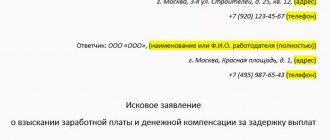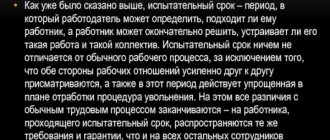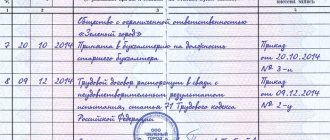You can try to negotiate with the manager about dismissal without service based on an agreement between the parties in accordance with Article 78 of the Labor Code of the Russian Federation. If the employer does not agree, then in order to dismiss during the probationary period at his own request, he will have to follow a certain procedure in accordance with Part 4 of Art. 71 Labor Code of the Russian Federation. The basis for termination of the employment relationship will be a statement made by the employee in writing. Let's talk about the features of this procedure.
How is a probationary period arranged?
The scheme when you are offered to enter into an employment contract after a probationary period is common, but illegal. This way, the employer makes his life easier: there is no need to fill out paperwork, and you can be kicked out any day and without payment.
According to the rules of the Labor Code of the Russian Federation, Article 67. Form of an employment contract, an employment contract is concluded within three days from the moment the employee is admitted to work, and the presence of a probationary period does not affect this in any way. But if it exists, it is written down in the document. This is usually done in the following formulations: “In order to verify the Employee’s suitability for the assigned work, a probationary period is established: __ months.”
If this is not specified in any way, there is no probationary period. Installing it is the right, not the obligation of the employer.
Typical employer mistakes for which the State Tax Inspectorate fines
The following mistakes should be avoided:
- long delay in formalizing relationships. The employment contract must be drawn up and signed within 3 days after the employee begins to perform duties. The contract must include a test; if this is not done, then such a condition is considered not included in the contract. Thus, the delay in drawing up the contract makes it impossible to include a test clause in it;
- unreasonable decisions. Dismissal during a probationary period by decision of the company administration must be justified. It is necessary to draw up a package of documents and an evidence base. Otherwise, dismissal during the probationary period may be considered illegal. Termination of a relationship without sufficient grounds should be avoided;
- poor information to the employee. He must be familiarized with all current local regulations, internal labor regulations, etc., so that he does not have the opportunity to plead ignorance when challenging management decisions. All documents when hiring and dismissing must be drawn up correctly (they must contain the employee’s notes that he is familiar with it), all wording must be as specified in the law;
- violation of the original conditions. This is unacceptable in an arbitrary manner; the law provides for a special procedure;
- inaccuracy of wording. When registering dismissal during a probationary period, it is necessary to comply with all formalities and rules and be sure to obtain all signatures of the employee;
- lack of precise terms. The contract must specify the purpose of the test in accordance with the wording of the law.
When terminating a contract, the formalities established by law must be strictly observed.
How long does the probationary period last?
By default, the probationary period cannot exceed three months. For managers and their deputies, chief accountants and their deputies, as well as heads of structural divisions, it can last up to six months (and if there is a separate law for this, then even more). If the employment contract is concluded for a period of up to six months, testing the employee is allowed for no longer than two weeks. There is no minimum threshold.
If an employee is absent from work due to illness or other valid reasons, the probationary period is increased by this period.
How can you terminate an employment contract during an internship in one day?
In some cases, a trainee may be able to avoid the statutory period for completion of employment. To answer the question - can you quit without working for two weeks, you need to know that there must be good reasons for this, which he can document:
- Relocation of the wife/husband to work in another region or country.
- Guardianship of a disabled relative who requires care.
- Staying on sick leave.
- Full-time education at an educational institution.
- Retirement.
- Conscription into the army.
- Violation by the employer of the terms of the contract or labor legislation.
An employee has the right to resign without working through a personal agreement with the manager, which must be documented (in a statement, additional agreement). He can justify his desire with other reasons.
How is work paid during the probationary period?
Job descriptions often indicate a low salary and promise to increase it after a probationary period. This is so common that it seems logical and obvious: the employer is just getting to know the person and does not want to pay him in full.
But this is illegal. The Labor Code prohibits the Labor Code of the Russian Federation Article 132. Payment for labor discrimination in determining wages. For example, in Nizhny Novgorod, the prosecutor's office fined a joint stock company for discrimination against employees and brought the company to administrative responsibility for the fact that employees on a probationary period received 30% less than colleagues in similar positions. The department considered that the employer should have paid equal pay for equal work. And this is far from the only case.
Do I need to work 2 weeks?
According to Art. 70 of the Labor Code of the Russian Federation, the permissible duration of the probationary period is up to 3 months. The exceptions are the head of the organization, the chief accountant, their deputies, and heads of individual structures - for them it is possible to increase the period to six months. For persons working under a fixed-term contract for a period of 2–6 months, tests last up to 2 weeks.
Both parties have the right to terminate the employment relationship during this period, which is regulated by Art. 71 Labor Code of the Russian Federation. That is, dismissal during the probationary period is carried out according to:
- employee decision;
- initiative of the employer.
It is possible to reach a compromise between the parties by formalizing an agreement.
If an employee resigns voluntarily, you need to notify the employer in advance and know how many days you need to work upon dismissal. However, the period of work at the end of the contract during the probationary period is reduced compared to the standard one.
Is it necessary if I resign of my own free will?
If the trainee considers the job or its conditions unsuitable for him, he has the right to quit at any time, informing the manager in writing 3 days in advance (Article 71 of the Labor Code). This period also includes weekends.
The working period for the standard termination of employment is 2 weeks; during the probationary period it is reduced to 3 days.
Termination of the contract during the testing period, at the request of the employee, is carried out in several stages:
- Submitting a corresponding application to the employer in person or by mail.
- Work within 3 days or its absence for good reasons, by agreement with the manager.
- Drawing up a dismissal order and familiarizing the employee with it.
- Issuance of a work book and other working documentation to the employee (upon request).
- Carrying out calculations and calculating payments.
The working period begins on the next day after the application is submitted and registered. A standard note about voluntary dismissal is entered into the work book. The legislation allows the use of such wording even if the employee fails the test (instead of a mark of unsuitability).
On the initiative of the authorities
Dismissal of an employee during a check of his professional qualities is permitted subject to compliance with the mandatory requirements:
- The employee must be informed about the termination of the employment relationship at least 3 days in advance.
- The leader identifies the reasons behind his decision. These include:
- disciplinary actions;
complaints from colleagues or clients;
- lack of qualifications and so on.
The employee must provide an explanation for his actions.
The employee has the right to appeal the manager’s decision in court, so the employer will need to confirm all evidence of unprofessionalism and violations.
The dismissal procedure then includes:
- 3-day work.
- Making an order.
- Payment of funds (including for unpaid vacation).
- Issuance of a work book. It contains a record of failure to complete the probationary period with reference to Art. 71 TK.
The employee must confirm in writing that he has read the documentation. Since the employee did not pass the test, severance pay is not accrued to him. It is possible to terminate the employment relationship without working off, by agreement between the parties.
An employer does not have the right to fire a person on a probationary period if he is on sick leave. This is permissible only by voluntary decision of the employee. And about dismissal after the probationary period is described here.
also not allowed to terminate a contract with a pregnant woman. According to the law, a probationary period is not applicable to her at all, but it happens that an employee finds herself in this situation already during the inspection period - then the employer does not have the right to fire her. A woman can leave work only of her own free will.
What to do if you do not agree with dismissal during the probationary period
If you fail to fulfill your responsibilities, the employer may terminate the employment contract. He must report this at least three days before dismissal in writing and indicating the reasons. There is no severance pay provided, but days of work must be paid.
The Labor Code does not define in any way the reasons why you may be fired during the probationary period. The employer himself assesses whether the employee has coped with his responsibilities. However, this does not mean that you should agree if his explanations seem far-fetched. You need to go to court within a month of the Labor Code of the Russian Federation Article 392. Time limits for applying to court for resolution of an individual labor dispute from the date of dismissal, and the employer will have to prove that you worked poorly.
You, for your part, can find evidence of good work and, also an option, violations on the part of the company. For example, if you were told about your dismissal on the last day of your probationary period, this is a violation.
If the court sides with you, you will be reinstated or your employment record will be changed to “dismissed at your own request” - as you wish.
Dismissal procedure
The procedure for leaving the workplace consists of the following steps:
- The employee fills out an application with a request to terminate the employment relationship.
InformationThe application does not have a clear template, but it should have: in the header an appeal to management, basic information, a summary with a signature.
- The second party must familiarize itself with the submitted petition and confirm it with a signature.
- Next, a dismissal order is issued, which the employee familiarizes himself with.
- After work (if it takes place), the employee is given: documentation (copies of passport, resume, diploma, etc.) with a calculation, a completed work book.
- A signature is affixed to the accounting journals regarding the payment and documents issued.
Statement
There are no legal requirements for filling out a resignation letter; any form of resignation is acceptable. The document contains information:
- Business name.
- Full name of the manager or other authorized person.
- Full name and position of the applicant.
- Statement of the request to dismiss at one's own request.
- Next, the date of termination of the contract is indicated, which is calculated from the next day after writing and registering the application by adding 3 days. For example, an application is submitted on Monday, March 1, and the dismissal date will be March 4, Thursday. On March 5, the employee may not go to work.
- Indication of good reasons for resigning early.
- Date of completion and signature of the employee.
If there will be no work or an agreement with the employer is planned, the date of dismissal may not be included in the application. Only the day the paper was filled out is indicated.
Sometimes organizations have their own forms, so it is recommended to contact the HR department before filling out the document. The application must be submitted no later than 3 days before the date of dismissal.
- When sending a document in person, it is advisable to prepare it in 2 copies, both of which are registered by the receiving person. One of the papers remains with the employee. He also has the right to demand in writing the provision of other working documentation (order, act of violations, etc.).
- The application is sent by registered mail with notification. In this case, it is not advisable to set a date of departure, since the countdown of three days will begin when the employer receives the document.
Dismissal for violation of labor duties
If an employee does not want to wait two weeks, but writes a letter of resignation and simply stops going to work, then these actions are regarded as a gross violation of labor obligations, on the basis of Part 6 of Art. 81 Labor Code of the Russian Federation.
To terminate an employment contract, it is sufficient that the employee is absent from the workplace without a valid reason for more than four hours in a row. To prevent an employee from appealing your decision after dismissal, you need to collect witness testimony or otherwise prove his absence, and also send the employee a letter demanding to explain why he did not come to work.
The problem is that if it comes to dismissal for absenteeism, the employee is unlikely to agree to such a development. And he will be able to prove that he was absent for a good reason - for example, due to an emergency in the apartment, a visit to the doctor, an urgent call to school. An employee can try to challenge the termination of a contract for absenteeism, including through court.
As a result, the process will take longer than the 2 weeks specified in the law. Therefore, if an employee wants to leave of his own free will, but does not want to work, it is easier to let him go by agreement of the parties. Or if you are not ready to act peacefully, engage a labor law specialist to study the nuances of a specific situation.
Briefly about when an employee can quit without working
- The concept of “working off” is legally incorrect. The law obliges the employee, in case of voluntary dismissal, to give notice 2 weeks in advance. But this does not mean that he has to serve this term.
- You can go on sick leave or vacation for these 2 weeks.
- Or negotiate with management and resign by agreement of the parties.
- You still don’t have to work if you can’t continue working. For example, in connection with retirement or enrollment in an educational institution.
- There is no need to give 2 weeks notice of dismissal if the employer violates labor standards. When an employer does not pay wages for more than 15 days, the employee can suspend work and, in addition, apply for resignation. There is no need to work during downtime.
- There is an exception to the 2 week rule. For example, when a manager or deputy resigns, you need to give a month’s notice.
- If an employee quits during the probationary period, notice must be given 3 days in advance. A similar period applies in the case of a fixed-term contract or a contract for seasonal work.
- If an employee does not want to work for 2 weeks, he can simply not come to work. In this case, the employer has the right to try to fire him for absenteeism. But such a decision will be canceled if the employee provides valid reasons for absenteeism. Therefore, it is easier to negotiate or let the employee go without two weeks of work.
When processing is not needed
Before determining the duration of the contract termination procedure, you should figure out whether a specific person needs to work out, based on specific circumstances. In some cases, it is impossible to reduce the working time. This happens when:
- The administration does not consider it necessary to retain the employee and is able to resolve the personnel issue immediately by hiring a new person without organizing the transfer of cases.
- The employer made errors in the execution of the written notice - the date of the expected termination of the contract was not indicated.
- A hired specialist reaches retirement age.
- Persons moving to another area without the opportunity to perform work duties.
- Future students of educational institutions accepted for full-time study.
The use of work during the probationary period has a lot of nuances, failure of which on the part of the employer threatens a lot of troubles, with courts and inspections, if the dismissed person decides to contact the appropriate structures to challenge the decision of management. For this reason, many employers prefer to dismiss personnel “at their own request,” eliminating the risk of invalidation of dismissal with shortened hours.
© 2021 zakon-dostupno.ru
- Related Posts
- Dismissal due to bankruptcy of the enterprise
- Dismissal of a pensioner according to the law of the Russian Federation
- Illegal dismissal of an employee: rights and responsibilities
What is mining and why is it needed?
The very concept of “working off” is not provided for in the Labor Code of the Russian Federation . However, in Art. 80 of the Labor Code of the Russian Federation states that an employee is obliged to notify of his intention to resign at least two weeks before the actual resignation . This period begins the next day from the date of filing the resignation letter. However, another development of events is also possible if the Code provides for a different period for the employee’s specific situation.
How to fire an employee who has not completed the probationary period?
Extension of probationary period
Dismissal during probationary period
Such a warning plays the role of a kind of guarantee for the organization , because the sudden loss of an employee can have a very painful impact on the work process as a whole. Depending on the position of the departing employee, of course. And the specified period gives the employer the opportunity to find an employee for the vacant vacancy without much damage to the company’s activities.
Plus, many people want to part with their former place of work and colleagues without any conflicts. During the indicated 2 weeks, you can complete the work you have started in order to calmly transfer the place to your successor.
The employee’s obligation to notify the employer of his own dismissal at least 2 weeks in advance is provided for in cases where the probationary period has already been successfully completed. That is, the employee was already on staff. This obligation does not apply to the probationary period.









